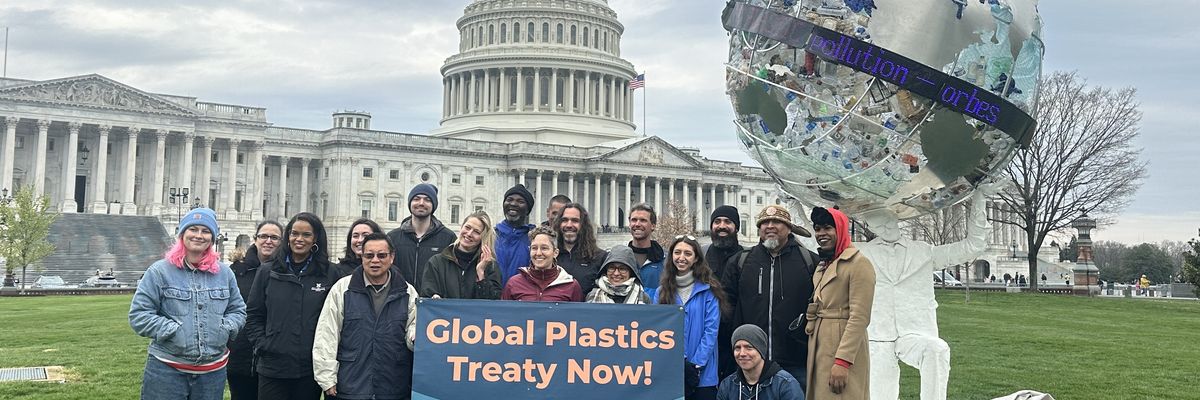Inspired by Atlas, who in Greek mythology carried the heavens on his shoulders, Greenpeace installed a 15-foot monument outside the U.S. Capitol on Thursday to pressure the Biden administration to support an ambitious global plastics treaty.
President Joe Biden "has the chance to cement a lasting legacy: He can be the president who put an end to the plastic pollution crisis, or he can be the one who let it spiral out of control," Greenpeace oceans director John Hocevar said in a statement. "We're calling on him to stand up to plastic polluters like Exxon and Dow and put us on a greener and healthier path."
The third round of treaty talks ended in Kenya late last year with little progress—largely thanks to fossil fuel and chemical lobbyists along with allied governments. The next round of negotiations is set to be held in Canada next month.
The "Biden's Plastic Legacy" monument features the president kneeling and holding up an Earth full of plastic. The base has a written message: "Biden, the world's in your hands. Is this your plastic legacy?"
"Plastic pollution is everywhere, impacting every aspect of our lives. It affects our health, harms our communities, and fuels the climate crisis."
The statue's unveiling ceremony included remarks from Dr. Leo Trasande, a world-renowned environmental health researcher at New York University, and Jo Banner, who lives in Louisiana's Cancer Alley and co-directs the Descendants Project, an environmental justice group.
"The communities of color that live among the plastic manufacturers are first in line for the toxic mix of pollution they produce," said Banner. "Our health, bodies, and communities matter. We refuse to be treated as a mere checkmark on a list of concerns, and we cannot continue to be sacrificial zones."
"We need President Biden to truly listen to our needs and help create a strong global plastics treaty that protects communities like ours," she added. "We must ensure that Cancer Alley is confined to the past, not a part of the future we gift our children."
Trasande noted that in addition to the public health argument for cleaning up the plastic industry, there's an economic one.
"The chemicals found in plastics cost our economy hundreds of billions of dollars because of increases in disease and disability," the doctor said. "The easiest way to stop these diseases is to address plastic production, and a strong global treaty is essential, for people here in the U.S. and around the world."
Research has repeatedly shown the pervasiveness of plastic pollution. A January study found that there are 240,000 plastic particles in the average liter of bottled water. Last September, researchers discovered microplastics in clouds, potentially "contaminating nearly everything we eat and drink via 'plastic rainfall.'"
A 2022 Greenpeace report revealed that U.S. households "generated an estimated 51 million tons of plastic waste" the previous year, and the vast majority ended up in landfills or as pollution.
"Plastic pollution is everywhere, impacting every aspect of our lives. It affects our health, harms our communities, and fuels the climate crisis," Greenpeace campaigner Kate Melges said Thursday.
"The global plastics treaty is a once-in-a-generation opportunity to create a cleaner, safer planet," Melges argued. "President Biden must rise to this moment by supporting a strong plastics treaty that prioritizes human health, cuts production, and ensures a just transition for workers and communities."
